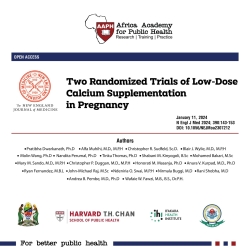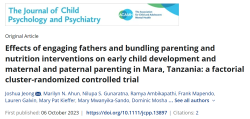
The World Health Organization recommends 1500 to 2000 mg of calcium daily as supplementation, divided into three doses, for pregnant persons in populations with low dietary calcium intake in order to reduce the risk of preeclampsia. We conducted two independent randomized trials of calcium supplementation, in India and Tanzania, to assess the noninferiority of a 500-mg daily dose to a 1500-mg daily dose of calcium supplementation. In these two trials, low-dose calcium supplementation was noninferior to high-dose calcium supplementation with respect to the risk of preeclampsia. It was noninferior with respect to the risk of preterm live birth in the trial in India but not in the trial in Tanzania.

We compared the independent and combined effects of engaging fathers and bundling parenting components into a nutrition intervention on early child development (ECD) and parenting outcomes. Jointly bundling parenting components into nutrition interventions while also engaging both mothers and fathers is most effective for improving maternal and paternal parenting and ECD outcomes.
Modern contraceptive use increased from 23.0% in 2004 to 34.3% in 2016. Differences in women’s characteristics contributed 12.5% of the increase in mCPR. These characteristics include partner’s education levels, recent sexual activity and being visited by a family planning worker. The difference in coefficients contributed 87.5% increase in mCPR. The most increase in modern contraceptive use was attributed to rural population (44.1%) and women who experienced a termination of pregnancy (7.1%).
In 2015, AAPH lead the implementation for the first time of the National Food Fortification Assessment Survey in Tanzania mainland and Zanzibar (FACT 2015, Survey). The Fortification Assessment Coverage Tool (FACT) is a survey instrument developed by the Global Alliance for Improved Nutrition (GAIN) for carrying out coverage assessments of large-scale food fortification programs.

